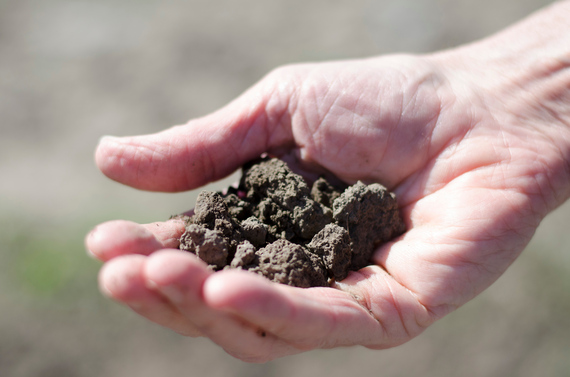If you ever visit Washington State University's certified organic teaching farm, chances are you'll find Regents Professor John Reganold there, bent over and closely examining a handful of soil, but don't mistake him for being myopic. This 2014 NRDC Growing Green Award winner has a broad vision for the world, a vision that he's shared with 4,000 students over three decades in education. If you like to eat, you should listen to what he has to say, too:
As Professor Reganold points out, successful farming starts with healthy soil, which can filter and hold the water that crops need to thrive and produce high yields. But even though he's teaching Soils 101, he wants his students -- the next generation of farmers -- to think more broadly about the world they're creating. Are our farms enhancing the environment? Are they financially viable? Are they contributing to the well-being of farmers and farming communities?
Unless the answer is "yes" to all those questions, Professor Reganold warns that we're in trouble. Too often, our focus has been limited to increasing yields on our farms -- undoubtedly a critical component to the continued strength of agriculture, but not the only indicator of a successful farming operation.
- As a leading voice for no-till agriculture, which he called "the quiet revolution" in a 2008 Scientific American magazine article, Professor Reganold acknowledged the challenge of shifting centuries old farming practices, and offered practical solutions, like increasing crop diversity, to overcome those challenges. He described no-till farming as "part of a larger, evolving vision of sustainable agriculture."
- His research on organic apple orchards in Washington State demonstrated that organic and integrated farming systems could not only be profitable, they could actually lead to higher profits and tastier fruit than conventional, pesticide-heavy systems. "The study proved that farmers can protect the health of their farm and earn more money by working with nature instead of against it," he said.
- He recognizes that if we want widespread adoption of truly sustainable farming practices, our federal policies need to reflect the full suite of values these types of farms provide. Professor Reganold is part of a critical group of researchers and educators who are shaping environmental policy. In a 2011 Science magazine article, he wrote that the slow uptake of innovative sustainable agricultural systems is "as much a policy and market problem as a science and technology problem."
It might seem like he's looking at a handful of dirt, but Professor Reganold is hard at work building a more sustainable agricultural system, one student at a time. As he put it, "We have to stop judging a farm by the size of its yield and start considering the health of its soil, the happiness of its employees, and the financial stability of its owners."
Congratulations, Professor Reganold, and thank you for your incomparable contributions to Food and Farm Education.
--
Professor John Reganold shows off some of the healthy soil from his certified organic teaching farm at Washington State University. (Photo: NRDC)
